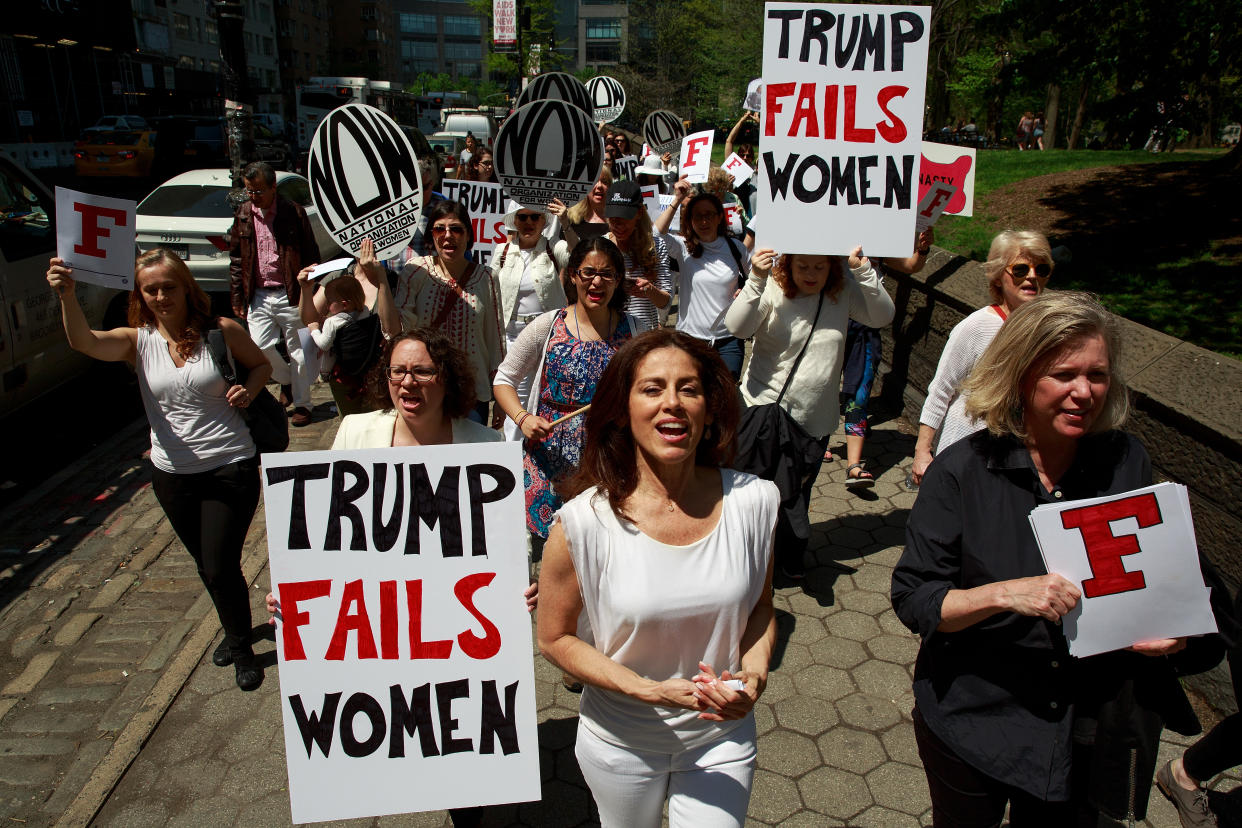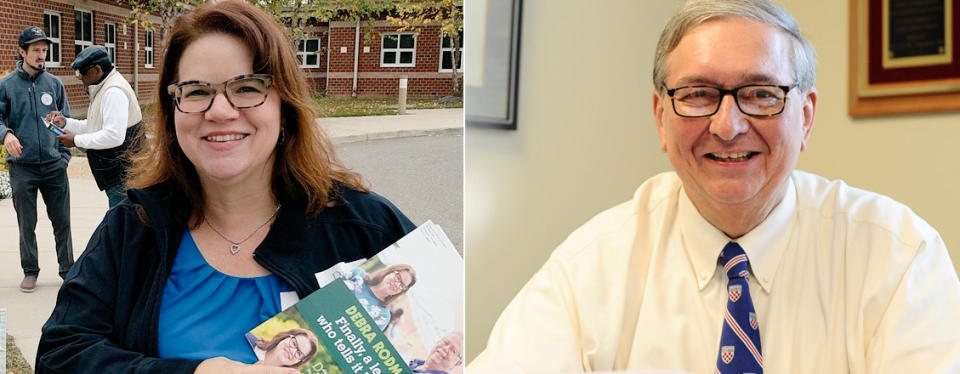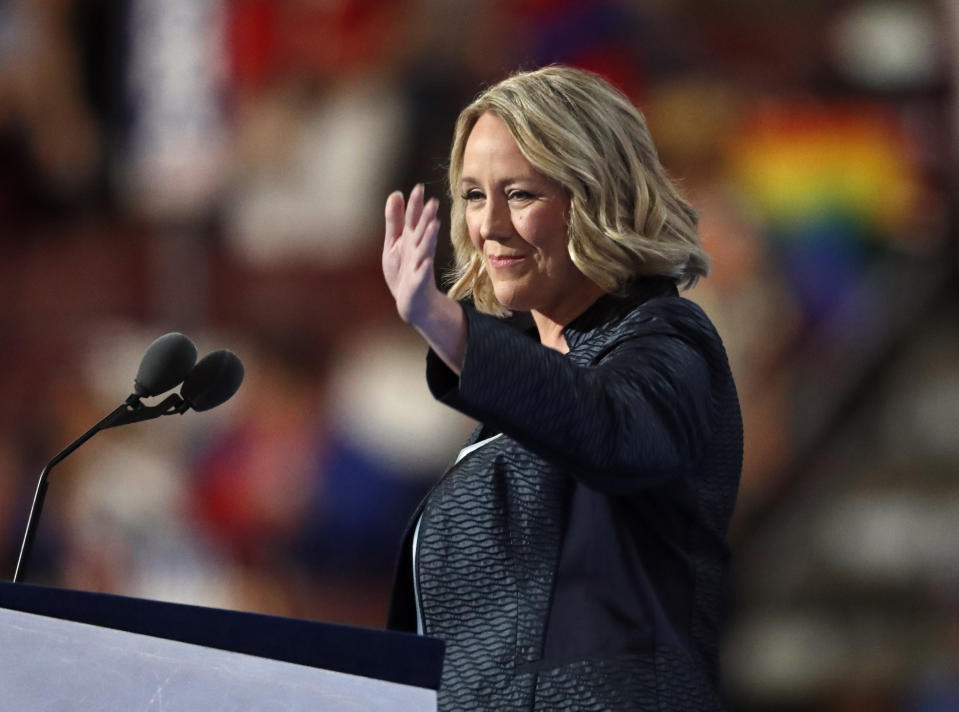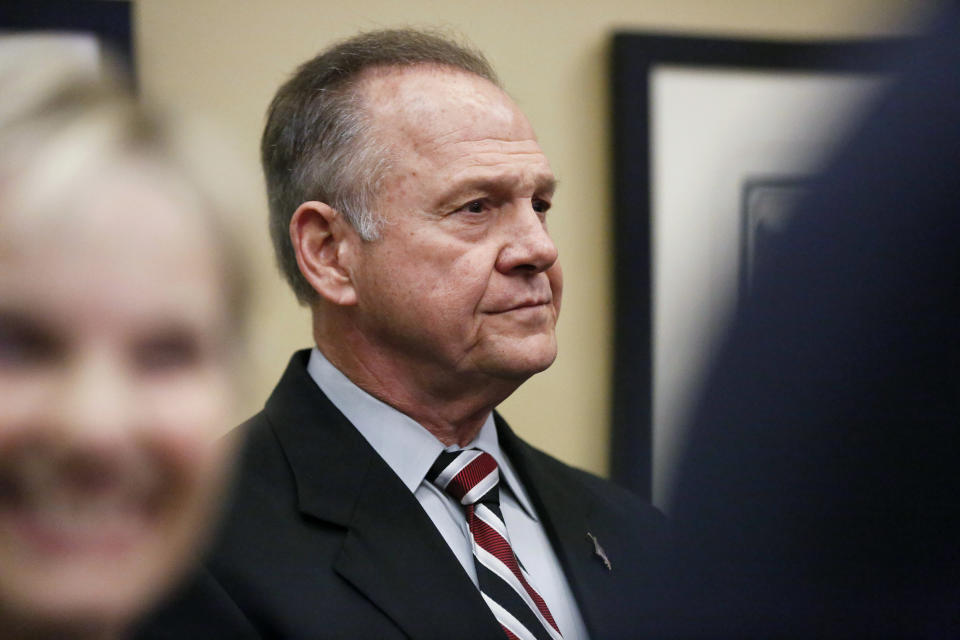Women's anger transformed the 2017 elections. Get ready for 2018.

WASHINGTON — Roiling anti-Trump sentiment. A massive grassroots mobilization by new resistance organizing groups. Women’s anger at politicians and a record number of female candidates. To that list of contributing factors to last week’s bicoastal Democratic victories, add another that is certain to factor into the 2018 races: deferred accountability.
Voters weren’t just voting against Donald Trump, they were taking action on years’ worth of accumulated grievances that had no outlet in districts where the only candidates running were Republicans. And that has profound implications for Democratic organizing efforts in 2018.
Take the case of Virginia’s 73rd House of Delegates district, outside of Richmond.
In 2012, a proposed transvaginal ultrasound law in Virginia became a major issue in the presidential race and part of that year’s War on Women narrative. The bill, which would have required women seeking abortions to undergo an invasive and medically unnecessary test, eventually became law after it was revised to require external sonograms of women seeking abortions rather than internal probes.
But since 2009, and until this year, no one had challenged Republican Virginia House of Delegates Rep. John O’Bannon, who voted for the law.
In his 17 years in office, O’Bannon, a staunch social conservative, had only faced three challengers —and only one of them a Democrat.
This year, Debra Rodman, who runs the women’s studies program at Randolph-Macon College, decided to run for office.
“I think the silver lining in (Trump’s) election is that people like me, women like me … now the doors have opened for us,” Rodman said in May. “I think this movement of people, especially women like me, is not just about resisting. It’s about advancing,” she told a Roanoke paper.
She beat three other candidates in the June primary and then ousted O’Bannon in the district, despite being outspent by nearly $200,000. She ran on a platform of holding O’Bannon, a doctor, accountable for his record of opposing the Medicaid expansion under Obamacare — as well as his record on women’s reproductive health concerns, from contraception to the 2012 transvaginal ultrasound law.

“John O’Bannon hadn’t seen a challenger since he voted for that bill until Debra Rodman stepped up to run,” said Ben Wexler-Waite, a spokesman for Forward Majority, a Democratic PAC founded by Obama campaign alumni to expand the field of contested state legislative races and a group that backed Rodman’s bid. “She proved him wrong, and the issue of choice and his vote over that ultrasound bill was a major issue in that race.”
“No one’s been shining a light on these guys,” he noted.
Democrats won five seats in the House of Delegates, among the 15 they picked up in total, that were uncontested just two years ago — an astonishing feat that has acted as proof of concept for groups like Forward Majority that are seeking to expand the roadmap for 2018 and retake some of the more than 1,000 state legislative seats that Democrats have lost since 2009. The lesson is that even seats that a Republican won unopposed in the last cycle can be successfully contested in today’s political environment — especially seats like Rodman’s, in a district where voters backed Clinton in 2016.
They’ll have plenty of candidates to choose from as they go forward. Trump’s election had already created a banner year for candidate recruitment. Now the boost of the 2017 election results is turning the torrent into a tsunami.
“We usually get 10 folks a day signing up to run for office,” said Amanda Litman, a former Clinton staffer who founded Run For Something, a political action group dedicated to recruiting and training first-time candidates for lower-level offices. “We’ve had nearly 400 people sign up to run for office since Tuesday, so six times greater than our expected rate, than what we would have predicted.”
The group is sponsoring a National Run for Office Day on Tuesday, Nov. 14, along with 41 other groups, from Bernie Sanders’s Our Revolution to Planned Parenthood, Swing Left and Flippable. The tagline of the day: “Uncontested elections are unacceptable.”

Since Trump’s election, EMILY’s List has been contacted by more than 21,000 women interested in running. “Since last Tuesday, that number has continued to skyrocket,” said Stephanie Schriock, president of EMILY’s List.
Not all of them plan to run in 2018, or even in 2020. But the past year has created a substantial population of possible candidates for Democrats to draw from for years to come.
“The Democratic bench for at least a decade will be made up of these women,” predicted Alexandra de Luca, a spokeswoman for EMILY’s List.
Everything is on agenda for the women: What the administration is doing, what their representatives are doing, what is happening in the culture at large.
“For women, the feeling of being under attack by their elected officials in a variety of ways is the most galvanizing, activating sentiment for them,” said Deirdre Schifeling, executive director of Planned Parenthood Votes, which ran a nearly $3 million digital campaign to turn out voters in Virginia and studied closely what motivated turnout. It is “the number one thing,” she said.
The current political moment for women is bigger than just Donald Trump. “We heard from voters repeatedly at the doors that their rights were under attack. The Me Too movement was just a continuation … of conversations we were already having about the importance of women’s issues and women stepping up and taking action,” said Jennifer Allen, CEO of Planned Parenthood Virginia PAC, describing the way October’s revelations about endemic male sexual harassment and abuse of women contributed to the female political upsurge.
Winning Democratic gubernatorial candidate Ralph Northam was dramatically boosted by women voters: Exit polls showed that 91 percent of black women voted for him, along with 77 percent of unmarried ones, helping to lift him to a 22-point edge with women statewide. That’s a bigger margin among women than Hillary Clinton’s 17-point edge. Health care was Virginia voters’s top issue too.
The results have Republicans on edge. “The numbers show Democrats spent millions more to fight in state and local races. Their money was invested in a network of over a dozen new and enhanced liberal, special interest groups, modeled after the [Republican State Leadership Committee’s] successful 2010 REDMAP program,” said RSLC President Matt Walter, right after the election. “Blue state majorities in Washington, Virginia and other states will remain targets in the coming years, but the results from last night indicate an elevated threat level. … We must be prepared for the Democrats’ enhanced organization and spending abilities.”
The political questions provoking female anger show no sign of abating. “If suburban women were mad on Tuesday when they turned out in droves, what happens when they hear R’s defending pedophilia?” tweeted conservative Washington Post columnist Jennifer Rubin, alluding to Republican statements of support for Judge Roy Moore’s senatorial bid in Alabama. Moore has been accused of sexually assaulting a 16-year-old and a 14-year-old in the 1970s and pursuing relationships with other teenaged girls, and while Republican Senate leaders have sought to drive him from the race, he shows no sign of stepping aside before the Dec. 12 special election.

Already Moore has become the Todd Akin of this political cycle — a regional candidate whose views and actions involving women create a controversy that tarnishes the national party and boosts Democrats. No Democrat has won a U.S. Senate seat in Alabama since 1992, but polling since the Moore controversy broke shows veteran prosecutor and Democrat Doug Jones has pulled even with or taken the lead from Jones in the contest for Attorney General Jeff Session’s old Senate seat.
In addition to state legislative races in key swing states, Democrats are looking forward to heavily contesting the 23 U.S. House of Representatives districts currently held by Republicans in districts Clinton won last year. EMILY’s List is already backing 11 women in races in those districts, and 15 over all. A record 357 women have already declared their candidacies for 2018, according to the Rutgers Center on Women and Politics — 292 of them Democrats. Of them, a record 183 Democratic women are seeking to challenge GOP incumbents — while only 14 GOP women are seeking to challenge Democratic ones.
The hope is that by having candidates running down-ticket, the congressional races will get the same boost Northam did in Virginia. “Simply having a Democrat in these House of Delegates races increased turnout by 1.5 percent over the 2013 election,” said Litman, one of the chief proponents of the “reverse coattails” theory of organizing that was proven effective in Virginia.
“Our theory as an organization is, if you run good candidates and you run them everywhere, they might win — and they’ll help turnout for Democrats across the board.”
Read more from Yahoo News:


